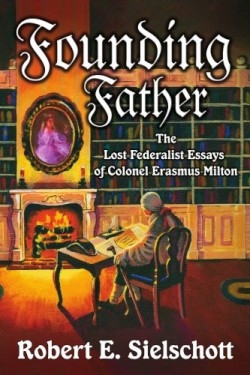Founding Father
The Lost Federalist Essays of Colonel Erasmus Milton
One must go to Jesus and the eleven to find a group of men who have more impacted the world for good.
Alexander Hamilton, with the help of James Madison and John Jay, penned a series of persuasive essays supporting ratification of the United States Constitution. Collectively these essays are known as the Federalist Papers and along with Washington, Adams, Franklin and the ideologically troublesome Thomas Jefferson, the men are referred to as Founding Fathers. Robert Sielschott is able to gain a direct pipeline to the true intentions of these Federalist high-fliers, when he meets Erasmus Milton, an overlooked Founder and close assistant to Hamilton, in 2004. That’s right, a contemporary of our first national leaders still draws breath around age two-hundred-fifty, keeping up with business interests in Ohio. Erasmus is afflicted with Dorian Gray speed-aging and can’t die until he’s passed on his tale to a conservative, property-rights-focused fellow traveler.
The book alternates between domestic scenes, with the old man adopted into Sielschott’s family, and Erasmus Milton’s own Federalist essays. Sielschott arranges to have them published in an Ohio newspaper under the penname Tacitus, an echo of Hamilton’s nom de plume, Publius. In exchange for doing so, Erasmus describes the personalities of leading Federalists. Some essays are historical in tone, others deal with hot-button political issues which are bandied about on talk radio. Erasmus’s essays are written with old-fashioned formalism, which sounds unnatural when dealing with currently-debated issues but works well for historical review.
While clearly in favor of Reaganesque laissez-faire policies, Sielschott gives due to the other side of the aisle in Jefferson, FDR, and Hubert Humphrey. He praises Martin Luther King, Frederick Douglass, abolitionists and civil rights marchers. Villains decried include Aaron Burr above all others, Benedict Arnold, Nathan Bedford Forrest, LBJ and Richard Nixon. Taxes for social programs and racial prejudice both take a pummeling, an unusual combination. Milton’s Spanish-born wife Elena sums up the latter, saying, “Have you ever known an intelligent bigot?”
Robert E. Sielschott owns an accounting firm in western Ohio. He advocates for the interests of small businesses and campaigned for Ken Blackwell in his 2006 failed bid for governor. Portions of this book have appeared in standalone form as newspaper opinion pieces.
This book is effectively organized, has an interesting fantastical premise and provides a curious mouthpiece in the character in Erasmus Milton. Sielschott, the fictional character, functions as a sympathetic inquisitor and sounding board but is less colorful. An ambitious mix of historical fiction and polemic, Founding Fathers will have readers talking back, either in affirmation or disagreement. Who said accountants lack imagination? A recommended read.
Disclosure: This article is not an endorsement, but a review. The publisher of this book provided free copies of the book and paid a small fee to have their book reviewed by a professional reviewer. Foreword Reviews and Clarion Reviews make no guarantee that the publisher will receive a positive review. Foreword Magazine, Inc. is disclosing this in accordance with the Federal Trade Commission’s 16 CFR, Part 255.

